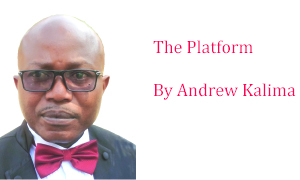 HUMAN insincerity will always ignore the primary role of a diplomat to build and improve relations with the host country.
HUMAN insincerity will always ignore the primary role of a diplomat to build and improve relations with the host country.
With the substitute of diplomatic role, the foreign envoy is likely be bound to falter the obligation of guiding his host country on topics that affect the plight of peoples and governments of both countries.
This is why the immediate former Cuban ambassador to Zambia Nelson Pages Vilas failed to connect with leaders and decision-makers of the two countries at the expense of sacrificing his duties because of the love of misplaced partisan political aggrandizement.
As part of his diplomatic role, he failed to look and find cooperating solution to some of the most challenging issues that make up part of his presence in this country which rests on economic, health, education, climate change, technological transfer, agriculture, including initiatives that strengthen domestic and policies and bilateral relations.
Sadly, we had a diplomat who had the audacity to cross the line by showing support to an opposition political party.
This is despite the fact that diplomats are charged with the role to promote peace, support prosperity, and protect interest of their and host countries.
The presence of the diplomat at the recent launch of the Socialist Party which he openly supported was ill-timed as it was against diplomatic etiquette.
This is why the Cuban ambassador went on to apologise to the Government but was issued a verbal warning as well as asked to leave the country in seven days.
Foreign Affairs Minister Joseph Malanji assured that Zambia’s longstanding bilateral ties with Cuba remain strong and will not be ruined.
“My Permanent Secretary had a meeting with the Cuban Ambassador (Vilas) this morning and the Cuban envoy is remorseful and admitted he crossed the red line so we have given him, a note-verbal registering our demarche and a seven day ultimatum to leave the country has been given,” he said in a recent interview.
The recalling of Mr Vilas was communicated to the Cuban government.
Special Assistant to the President for Press and Public Relations Amos Chanda says the conduct of Mr Vilas was unbecoming of a diplomat as he pledged to support the opposition Socialist Party when it was recently launched.
I support Economic and Equity Party (EEP) leader ChilufyaTayali when he argues that the support by Mr Vilas to the Socialist Party compromised his position as a diplomat.
With all his opposition support, how was he expected serve the interest of Zambians? He is accredited to the country which is under the PF administration and it is absurd to expect him to balance the support between the people of Zambia under the leadership of President Edgar Lungu and the aspiration of an opposition political party because of different interests at play.
Mr Vilas presented his letter of credence to President Lungu a few weeks ago before gracing an opposition ‘party’ where he played gallery to aspirations of the opposition political platform, which, to me, was an insult to the principles of diplomacy.
His conduct offers strong lessons to other diplomats accredited to Zambia. They should not entertain diplomatic insincerity at any cost.
It is unfortunate that Mr Vilas ignored his role to help build and improve relations with his foreign host country by wishing the newly launched Zambian Socialist Party the best of luck.
He should have instead concentrated on offering guidance to his host country on topics that affect the well-being of the Zambians and his government.
His task is to connect with leaders and decision-makers in both governments and local community leaders and members.
Anthony Mumba, the former Zambian diplomat, who served at the Zambian Embassy in the United Kingdom, supports government for acting prudently by expelling the Cuban Ambassador to Zambia.
Mr Mumba believes, like many other , that expelling the diplomat was the way to go as the action was a strong message to many other diplomats who could be tempted to show favouritism for a political party.
As such, it is expected that diplomats should not engage in local politics because this would cripple bilateral relations, which affects national development.
Diplomats should not declare any political inclination of any opposition political ideologies.
They should not be allowed to meddle in internal politics because this would compromise their ability to represent relations between the host country and theirs.
For now, the expulsion of the Cuban diplomat should not attract unnecessary debate because this is not the first case.
For instance, in recent times, two Liberian diplomats were expelled from the United Kingdom after reports that her Majesty’s Government declared them persona non-grata.
The two Foreign Service officials were Jay Napoleon Toquie II and Chester DwehBarh, Sr.
Though details of their crimes were not immediately revealed.
South Africa also expelled three Rwandan diplomats it linked to a raid by gunmen on a dissident exiled Rwandan general’s home and Rwanda ordered out six South African envoys in retaliation.
Three diplomats from the Rwandan mission in Pretoria were ordered out of the country in 48 hours. Kigali’s tit-for-tat expulsions followed.
Insincerity will always affect the primary role of diplomats who go off their way to serve personal interests instead of promoting bilateral relations between their country and host nations.
The expulsion of Cuban envoy is a lesson to all diplomats.






